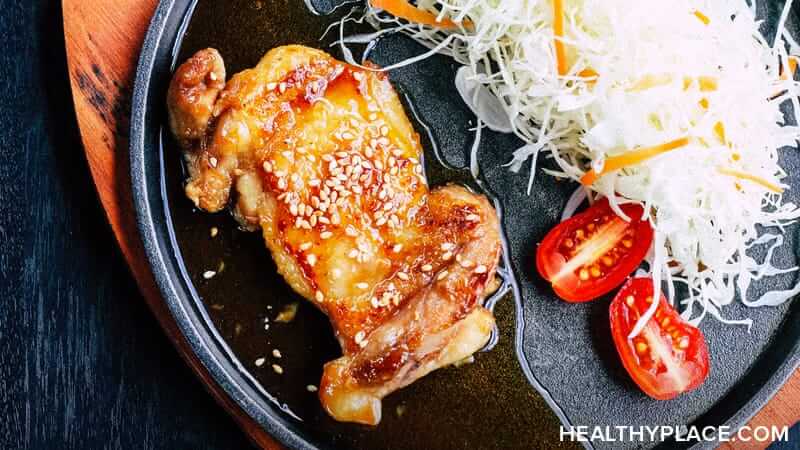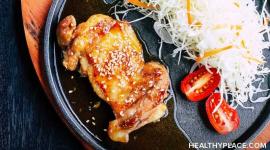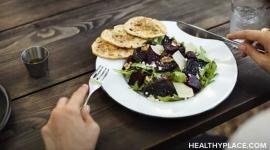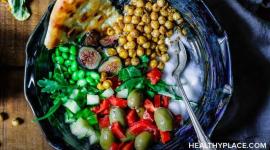Which Foods Help Your Depression?

When helping depression, food is important, and nutrition is becoming one of the major treatments for depression. While even the best foods for fighting depression don’t necessarily replace medication or therapy, they are an important healing tool because diet is such a significant part of brain health and functioning. Foods for depression can be an essential part of someone’s treatment plan.
When it comes to brain functioning in general and depression in particular, food is a lot like pharmaceutical treatments in that its chemical structure communicates and interacts with the brain, impacting our thought, emotions, moods, decisions, and more (Serani, 2011). The old adage “you are what you eat” seems to be quite relevant. Specific foods to help depression work with the brain on a neurochemical level to make positive changes in mood.
How Food Helps Your Depression
The foods that help depression are the ones that counteract the symptoms and effects of depression. Depression zaps energy and motivation as well as the ability to feel joy and pleasure. It disrupts sleep, making people sleep too much or too little. Depression brings on an often crushing sadness or low mood, and it can cause irritability. Major depressive disorder disrupts appetite and can cause someone to eat too much or too little. It makes it hard to think or concentrate (unless someone is thinking of their perceived worthlessness and guilt).
Any one of these things can make eating well difficult. Planning, shopping, preparing, and dealing with food at all can become gargantuan tasks. Ironically, though, all of these things can be helped with proper nutrition.
Foods good for depression are things such as lean protein, fish, complex carbohydrates, fruits, and vegetables (more on diet and depression). Here’s why:
- Proteins are our source of amino acids, which build neurotransmitters like serotonin; people with depression have low serotonin levels, and protein can increase serotonin, clear the mind, and boost energy
- Carbohydrates supply glucose (energy) to the brain; in depression, people lack the energy to live well
- Good fats build cell membranes for healthy brain structure
- Vitamins and minerals are essential nutrients that turn glucose into energy, help the amino create neurotransmitters, convert simple essential fats into complex fats, and more
Specific Foods for Depression
Proteins that help depression include poultry like chicken and turkey, lean beef, tuna, and chickpeas. Interestingly enough, all of these, even turkey, provide energy. If you’ve heard of tryptophan, you might associate it with both turkey and sleepiness. As an amino acid that is a precursor to serotonin, tryptophan’s big picture is actually to help increase energy.
Carbohydrates also are linked to increasing serotonin and providing energy. Whole grains, legumes, fruits and vegetables are healthy sources of this essential brain food.
To be healthy, the brain needs vitamins and minerals. Fruits, vegetables, legumes, nuts, seeds, and whole grains are excellent sources of a wide range of the vitamins and minerals the brain needs to function depression-free (see vegan diet and depression).
Good fats, like Omega-3 fatty acids, are necessary to prevent or treat depression. Fatty fish, flaxseed, canola oil, soybean oil, nuts (especially walnuts), and dark green, leafy vegetables are good sources of important healthy fats.
All of the above foods are mood-boosting foods for depression because of how they interact with the brain. They go beyond simple mood-enhancement, though, to counteract most or even all of the symptoms of depression.
Having a rich and varied diet of these depression-fighting foods will help ensure that you give your brain a range of helpful nutrients. No single food contains everything your brain needs to stave off depression, but the more of these nutrient-rich foods you eat, the better your brain and your mental health will be.
Head to the store, or ask someone to go for you, grab these foods, and feel how eating foods that help your depression makes a very positive difference in your life.
APA Reference
Peterson, T.
(2021, December 30). Which Foods Help Your Depression?, HealthyPlace. Retrieved
on 2026, January 19 from https://www.healthyplace.com/depression/food-and-depression/which-foods-help-your-depression



